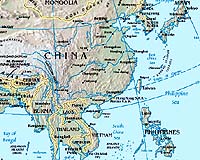 |
Washington (AFP) Feb 3, 2011 Former US defense secretary Donald Rumsfeld makes no apologies for his handling of the Iraq war in a new memoir, but says his biggest regret was not stepping down after the Abu Ghraib prisoner abuse scandal, US media reported Thursday. In "Known and Unknown," Rumsfeld -- a lightning rod for criticism during his long tenure at the Pentagon -- defends his handling of the war and his major policy decisions, according to advance copies obtained by the New York Times and the Washington Post. But he said he wishes he had forced then-president George W. Bush to accept his resignation over the revelations of abuse by US military guards at the Abu Ghraib prison in Iraq. "Abu Ghraib and its follow-on effects, including the continued drum-beat of torture' maintained by partisan critics of the war and the president, became a damaging distraction," Rumsfeld writes. "More than anything else I have failed to do, and even amid my pride in the many important things we did accomplish, I regret that I did not leave at that point." Rumsfeld, now 78, ended up staying in office for another two-and-a-half years until Bush sacked him following a Republican defeat in 2006 legislative elections in which the unpopular Iraq war played a major role. Rumsfeld argues, however, that the abuse at Abu Ghraib was the result of rogue soldiers and not policies he helped draft, a stance that rights groups have rejected. The ex-Pentagon chief also said that the administration should have sought approval from Congress on the treatment of "war on terror" detainees, instead of sticking with a more unilateral approach favored by then vice president Dick Cheney. But Rumsfeld makes no apologies for his approval of harsher interrogation techniques, the management of the prison at Guantanamo Bay or the creation of military tribunals to try terrorism suspects. The former defense secretary also denies that he ever rejected appeals from military commanders for more troops to invade Iraq, saying he never received a formal request, the Times reported. Retired officers and numerous accounts of the run-up to Iraq have portrayed Rumsfeld as insisting repeatedly on a smaller force for the invasion. "In retrospect, there may have been times when more troops could have helped," he writes. Rumsfeld also describes Bush telling him to dust off contingency plans for a war with Iraq only 15 days after the attacks of September 11, 2001, even before the US military led an assault on the Taliban regime in Afghanistan. "He asked that I take a look at the shape of our military plans on Iraq," he writes. In other accounts, Rumsfeld has been portrayed as proposing an attack on Iraq soon after the 9/11 attacks. He uses the memoir to settle scores with some of his longtime rivals and critics, including former secretaries of state Colin Powell and Condoleeza Rice, as well as Senator John McCain. Rumsfeld accuses Rice of failing to manage policy debates when she served as Bush's national security adviser and describes McCain as having a "hair-trigger temper" with a tendency to curry favor with the media. Asked about the description, McCain told ABC television on Thursday that Rumsfeld's departure rescued the war in Iraq as the former defense secretary's strategy was "doomed to failure." "Thank God he was relieved of his duties and we put the surge in. Otherwise, we would have had a disastrous defeat in Iraq," said McCain, referring to a "surge" of additional troops after Rumsfeld left office. The book also covers Rumsfeld's long career in politics and government before the Bush era, including stints under presidents Richard Nixon and Gerald Ford in the 1970s -- when he served as defense secretary for the first time. The title of the memoir plays on Rumsfeld's famous and much-lampooned remark about what was known about Iraq allegedly providing weapons of mass destruction to terrorists. "There are known unknowns; that is to say, there are things that we now know we don't know. But there are also unknown unknowns; there are things we do not know we don't know," Rumsfeld said at a press conference in 2002. According to his spokesman, proceeds from the memoir will fund charity and aid projects backed by Rumsfeld's foundation.
Share This Article With Planet Earth
Related Links Learn about the Superpowers of the 21st Century at SpaceWar.com Learn about nuclear weapons doctrine and defense at SpaceWar.com
 US eyes more Asian defense talks
US eyes more Asian defense talksWashington (AFP) Feb 1, 2011 Asian and US defense chiefs should consider meeting more frequently to smooth out relations after last year's inaugural talks in Vietnam, a senior Pentagon official said Tuesday. The October talks brought together defense ministers from 18 nations including the United States and China at a time of tension in much of Asia over Beijing's growing military might. Robert Scher, the top Pentag ... read more |
|
| The content herein, unless otherwise known to be public domain, are Copyright 1995-2010 - SpaceDaily. AFP and UPI Wire Stories are copyright Agence France-Presse and United Press International. ESA Portal Reports are copyright European Space Agency. All NASA sourced material is public domain. Additional copyrights may apply in whole or part to other bona fide parties. Advertising does not imply endorsement,agreement or approval of any opinions, statements or information provided by SpaceDaily on any Web page published or hosted by SpaceDaily. Privacy Statement |